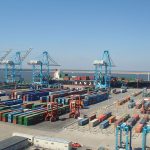In Global Logistics, Lost in Translation Could Mean Lost in Transit
This is a guest post by Ofer Tirosh.
 Translation is involved in virtually every aspect of business for an international logistics company. For the domestic shipper, it is still likely that there will arise a need for translation services at some stage in their operations, but it will not happen with the same frequency or sense of urgency that it will when involved in international or global logistics. Is it worth hiring a professional translator to work on staff or should these services be contracted out to a professional translation agency? What is the job of the translator in regards to global logistics companies?
Translation is involved in virtually every aspect of business for an international logistics company. For the domestic shipper, it is still likely that there will arise a need for translation services at some stage in their operations, but it will not happen with the same frequency or sense of urgency that it will when involved in international or global logistics. Is it worth hiring a professional translator to work on staff or should these services be contracted out to a professional translation agency? What is the job of the translator in regards to global logistics companies?
Running a fleet of trucks up, down, and across an entire nation is challenging to be sure, but tracking ships and international packing crates around the globe can be slightly more challenging. Add in import and export restrictions, customs regulations, international law, and a host of different languages, and the task becomes much more intimidating. The job of the international logistics company is more than just challenging, and it is necessary to determine what the best options are to get the best professional translation services based on the needs of the logistics firm.
There are also numerous logistics service providers who fall somewhere inbetween these realms. While this is most notably the case in third world and developing nations where localized deliveries are more restricted, it can also be an issue of concern in more industrialized nations as well. Some of these logistics service providers will be affiliates or smaller companies, contracted with larger, more global logistics providers such as Universal Cargo.
The process of global logistics also involves a great many cross-commercial interests, including warehousing and storage of goods before, during, and after transport, dealing with additional logistics providers for shipping including by truck, train, cargo vessel, airplane, or other means. This will often involve different types of companies sharing and exchanging documentation including bills of lading, storage receipts and a host of other paperwork, which all must be accurately, completely, and quickly created, translated, and provided to all of the requisite parties.
The extent to which these services are necessary will depend on the extent to which the individual logistics firm is actually involved with the supply chain and the physical transportation of goods, materials, and other supplies across international borders. Again, one of the benefits of working with a firm like Universal Cargo is the ability to have all of the requisite services provided by a single company, replete with all of the necessary representatives virtually anywhere in the world.
What is the Function of a Translator in Terms of Global Logistics
The translator for an international logistics firm must be very flexible and diverse in their linguistic skills, training, education, and experience. Translation services for the international logistics companies are not quite as easy as providing a literal translation for every document.
The role of a professional translator for international logistics companies may find a job doing legal document translations one day, generally, though not always due to insurance claims which can come from quite literally anywhere in the world. Additional legal document translation services may be required for compliance with import and export laws and customs documents. The next day the professional translators may be translating a press release or a bill of lading or even inventories or warehouse receipts or even asked to assist with international marketing campaigns.
The Law of International Trade can be very confusing for those who do not make a habit of keeping up with the whims of governments and regulatory agencies around the globe. Any translator who is working for an international logistics company must be very flexible, very knowledgeable, and constantly work to keep up with all of the latest relevant information in regards to their needs.
The only bad thing about this is that it tends to drive up the price that they can command for their wages. In short, hiring a professional translator on staff may be far too expensive an option for smaller logistics companies. Conversely, not employing such a person may leave the logistics company with compliance issues or other legal headaches that could otherwise easily have been avoided.
 In some cases, such as Warehouse Receipts, Safekeeping Receipts or other documentation, a literal translation is absolutely mandated for the sake of accuracy. In other instances, it will be necessary for the professional translator to operate in such a way that allows them to focus more on the lexical meaning rather than the literal translation. This is most common in cases where professional translators are used to translate marketing and advertising campaigns. In such cases, literal translations may have an adverse impact instead of being able to trigger the desired emotional response from the targeted market.
In some cases, such as Warehouse Receipts, Safekeeping Receipts or other documentation, a literal translation is absolutely mandated for the sake of accuracy. In other instances, it will be necessary for the professional translator to operate in such a way that allows them to focus more on the lexical meaning rather than the literal translation. This is most common in cases where professional translators are used to translate marketing and advertising campaigns. In such cases, literal translations may have an adverse impact instead of being able to trigger the desired emotional response from the targeted market.
Not every nation in the world is set up to conduct business operations in internationally recognized languages. Some nations are. Some individual firms that contract out with larger international firms will be set up to handle documents in languages other than their own, and some will not. It is the role of the logistics company to determine when and where there is a viable need for a professional translator, but it remains the role of the translator to know all of the details and specific needs depending on the type of translation required to get the job completed and to ensure compliance with all of the relevant laws at the same time.
What Percentage of the Logistics Firms Requires Translation Services
Percentagewise, the work of a translator — even in an international logistics company — is somewhat restricted and small. The concerns are more prevalent, however, for international logistics companies that work throughout a great many different nations.
In 1995 as part of the North American Free Trade Agreement or NAFTA, Mexican logistics operations and material supply chains were allowed into the US markets and on to the US roads for the very first time. In those cases, for the logistical companies it was probably best to hire translators as part of their staff. All of the necessary legal documentation for the supply chain management and logistical support would only have to be translated from English to Spanish and from Spanish to English. In those circumstances, one or two translators would most likely be able to handle all of the legal and technical translations without any major difficulties.
For larger logistical supply chain service companies, the problem is not so much regarding what percentage of the work will have to be translated, but the number of different languages that will have to be accommodated. A cargo ship leaving the San Diego Port in Southern California in the United States may first make its way to the Panama Canal where all of the documentation may have to be presented in Spanish. Heading South, it would then come to locations where Portuguese was the preferred language.
By the time an international cargo freighter gets from the United States to its final destination, it may encounter numerous instances where different languages are required, meaning that it is not possible for the international logistics companies to hire a single translator, but rather will require a full team of translators in order to get a single job completed in some cases. In these cases, it is more likely than not that it will be best to secure the services of a professional translation agency. There are always exceptions, however.
What are the Benefits and Liabilities of an Employee Translator vs Professional Translation Services
Legal Liability: When using the services of a professional translation agency, the agency will generally have the means in place to accept liability for numerous factors, including getting the translation work finished accurately, on time, on a set budget, and — in some cases — even for any issues as may arise from the document translation services. When the company hires an employee to perform the translation services, the company is solely responsible on every level and will have no additional recourse for problem resolution.
Tax Liability: There are both tax liabilities and tax benefits to having full time employees, but the costs may tend to outweigh the benefits if those employees cannot be utilized to their full potential. In the case of hiring a third-party company, such as one that provides document translation services, there is only the initial cost and then an immediate tax relief as a cost of doing business. In the case of full-time employees, there will be a host of tax differentials that must be literally accounted for by the accounting department. The question then becomes whether or not the services provided by the in-house translator will be sufficient to justify the position. This is generally relegated to the analysis involved in a cost-benefit report.
Availability: There is one place where the in-house translator will have a decided advantage over most professional translation agencies and that is in the area of availability. While there are some professional translation agencies that provide live service 24-7, it tends to be the exception rather than the rule. Another common factor that is too often overlooked in terms of international business is the time difference where “office hours” become jumbled and confusing.
In the financial institutions, international matters are generally expected within “seventy-two international banking hours” meaning within three business days, giving allowance for the differences in time zones. While these same principles may hold true in regards to international shipping, when the ship encounters a rogue wave in the middle of the night, and time is quite literally of the essence, even the smaller logistics companies may benefit from having someone on staff ready to take that call, no matter where in the world it may come from.
What is the Bottom Line Cost vs Benefit Analysis and Result
The bottom line for any international logistics company is always going to be determined by whether or not the benefits of an in-house translator will be able to provide a sufficient level of service to the company or be capable of filling other roles when translations are not needed to determine whether or not the position is worth creating within the company.
As machine learning improves, machine translations may be quite capable of handling those cases wherein an exact and literal translation is all that is needed. This may include inventories, invoices, and other simpler documents required for international shipping. In other cases, there are at least some translation agencies that do provide live, 24-7 support services that will always be available, even in times of emergency when an actual interpreter may be required in addition to the professional translator.
The best option, however, may be simply to choose an international logistics company like Universal Cargo that can provide all of the solutions in a single, concise package for all of your international shipping needs. The benefit here, again, is that all of the requisite services, including documentation and reports and tracking, are all provided in a single package, on budget, on time, and at reasonable rates.
If, on the other hand, you are a professional translator and looking to secure a job with an international logistics company, it is definitely a good idea to hone your skills in the different fields where your specialties will be needed. Brush up on the Laws of International Trade, UCC restrictions for International Contract Law, and Import and Export Law. Once all of that is completed, you should have no difficulties finding work with any of the major international logistics companies.
 This was a guest post by Ofer Tirosh.
This was a guest post by Ofer Tirosh.
Author Bio:
Ofer Tirosh is an entrepreneur and the CEO of Tomedes, a translation agency. His primary focus is on globalization through localization strategies and language services.



